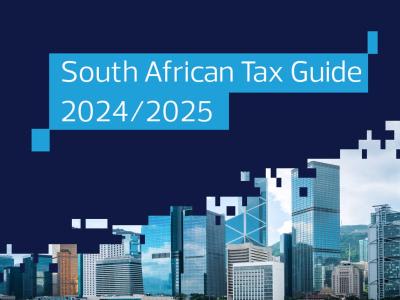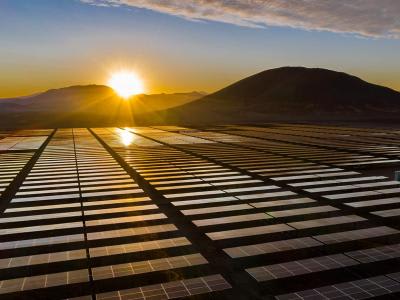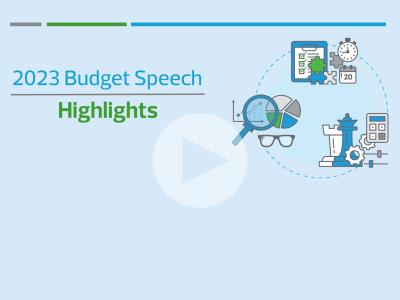Finance Minister Enoch Godongwana has presented his second budget speech in 2023. The Minister opened his speech with an acknowledgement of the difficult domestic and global economic environment we are faced with at present.
One positive aspect he highlighted was that tax revenue collections for the 2023 fiscal year are expected to exceed the 2022 budget forecast by R93.7 billion. As a result, there are no major tax proposals in the budget.
The following is a summary of selected tax proposals:
Personal tax brackets
The personal income tax brackets will be adjusted to account for an inflation based adjustment. There will be no change in the maximum marginal tax rate. This will result in the tax threshold for a person under the age of 65 increasing from R91 250 to R95 750.
Medical tax credits
The monthly medical tax credit for the first two members will be increased to R364, with the credit for additional members increased to R246 per month.
Retirement tax tables
The retirement lump sum tables that apply to lump sum withdrawal benefits as well as lump sum retirement benefits will be adjusted upwards by 10%. As a result, the tax free amount on retirement will be increased to R550 000, whilst the tax free amount on a withdrawal will be increased to R27 500.
Transfer duty
The transfer duty tables will also be adjusted upwards by 10%. The result is that no transfer duties will be levied on transfers of properties with a value of less than R1.1 million.
Expansion of renewable energy tax incentive
The current incentive available for businesses to promote renewable energy will be expanded over the period from 1 March 2023 until 28 February 2025.
The expanded incentive will enable businesses to claim a deduction of 125% of the cost incurred, in the first year, for all renewable energy projects where the investment is brought into use during the two year period.
There will be no thresholds on the generation capacity from the project to qualify for the incentive.
Rooftop solar tax incentive
In the interests of increased electricity generation, there is a proposed incentive, in the form of a tax rebate, for individuals installing solar power solutions.
In order for the individual to qualify for the tax rebate, the solar panels must be purchased and installed at a private residence, and a certificate of compliance must be issued over the period from 1 March 2023 until 29 February 2024.
The tax rebate will be 25% of the cost of new and unused solar panels, with a limit of the rebate in the amount of R15 000.
Fuel Levies
In order to reduce the pressure on households and businesses, there will be no changes to the general fuel levy of the Road Accident Fund levy.
Base erosion and profit shifting
In terms of Pillar Two of the OECD framework, it proposes an approach to ensure all internationally operating businesses with global annual revenue of more than Euro 750 million pay an effective tax rate of at least 15%. During the 2023 legislative cycle, government will publish a draft position on the implementation of Pillar Two for public comment, with draft legislation intended to be included in the 2024 Tax Laws Amendment Bill.
Research and development tax incentive
It has been proposed to extend the incentive for 10 years from 1 January 2024. In addition, it is proposed to refine the definition of R&D to make it more understandable and easier to administer.
Urban Development Zone incentive
The policy review process will not be completed by the 31 March 2023 sunset date. It is proposed to extend the incentive until 31 March 2025 while the review process is completed.
Health promotion levy
The sugar industry suffered challenges from regional competitive pressures as well as the recent floods and public violence. In order to support the stakeholders to restructure, there will be no increase in the health promotion levy in 2023/24 and 2024/25.
Ceasing to be a tax resident
The Income Tax Act was amended in 2022 to apportion the annual interest exemption and capital gains exclusion, applicable to individuals, when they cease to be tax residents. To ensure alignment, further changes are proposed to apportion the tax free investment contribution and the annual limit on deduction of retirement fund contributions when ceasing to be a tax resident.
Reviewing Practice Note 31 and Practice Note 37
PN31 addresses the deduction of interest paid on moneys borrowed, and PN37 addresses the deduction of fees paid to accountants, bookkeepers and tax consultants for the completion of income tax returns. SARS issued a notice in November 2022 signalling the intention to withdraw these PN’s with effect from 1 March 2023. Subsequent to public consultation, SARS intends to delay and align the withdrawal of the PN’s with the effective date of any new inclusion into the legislation to address these matters.
Interest limitation rules
Section 23M of the Income Tax Act contains rules related to the limitation of interest deductions for debts owed to certain persons not subject to tax. Government has identified that these provisions require clarification in a number of areas to ensure the intended policy outcomes are achieved.
Taxation of non-resident beneficiaries of trusts
Paragraph 80 of the Eighth Schedule makes provision for capital gains to be attributed only to beneficiaries who are South African tax residents. In contrast, Section 25B does not distinguish between beneficiaries who are and who are not South African tax residents. It is proposed that changes be made to Section 25B to align it with the provisions of paragraph 80.
Neil Hughes
Director: Tax





